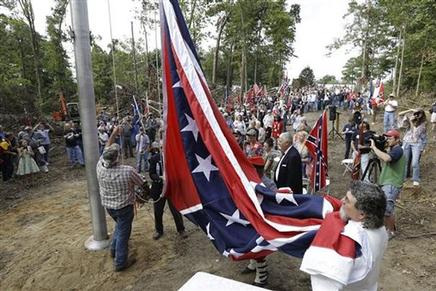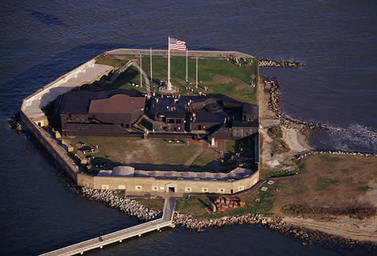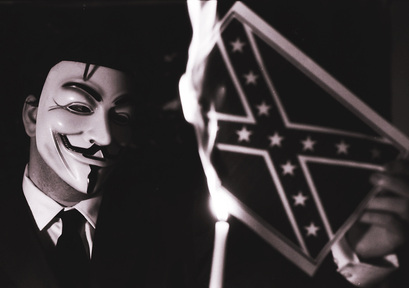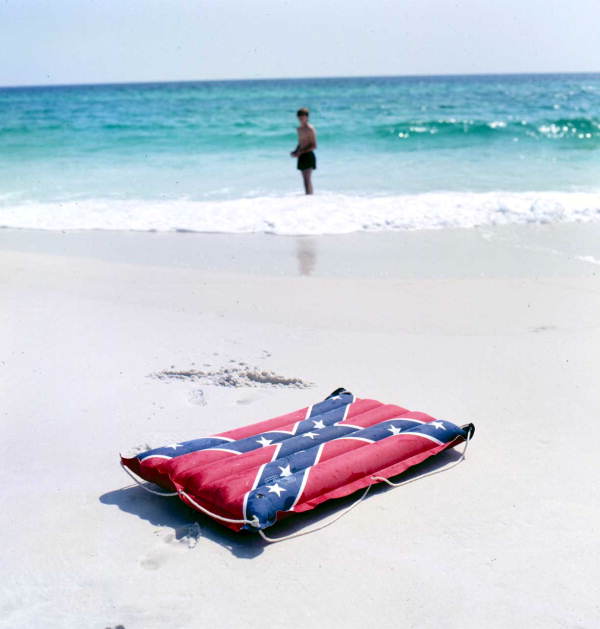|
The Breadcrumbs widget will appear here on the published site.
A Modern War of Ancestral SymbolsBy Kontra QuailBellMagazine.com I grew up in the first state ever to secede from the Union. It was on the shore of South Carolina that my parents purchased me the only Confederate flag image I have ever owned: a raft on which I rode the waves of Myrtle and Lion's beaches. Though I only personally handled this symbol during the humid southern summers, it surrounded me at all times. In fact, the Dixie flag flew over the South Carolina statehouse until the dawning of the 21st century, and while it can no longer be seen flapping in the breeze above the capital, it still sits on the lawn of the building. I now live in Richmond, Virginia, a city positively saturated in Civil War history and legend. (Let there be no doubt: I am a Southerner.) It is here, in the capital of the Confederacy, that the ideological warfare surrounding the flag has found its latest incarnation. As fall rolled across the Eastern Seaboard, two symbols were simultaneously hoisted over the city.  The first, a Southern Cross raised alongside Interstate 95, which now connects Richmond to the former Union capital of Washington, D.C. It was displayed by the Virginia Flaggers, a group that considers flying the flag “a way to protect and defend all Confederate heritage," openly rejecting the notion that it is, for them, a symbol of racism or slavery. “Heritage not hate," as the saying goes. The second: the Stars and Stripes. This (much larger) American flag was hung from a construction crane downtown in protest of the Confederate display. United RVA, the organization who paid for the display, gave interviews to local news channels to explain: “We have a flag that unifies all of us here in Richmond, Virginia, and it's the American flag. The Confederate flag is a symbol that at best divides our community, and at worst is a symbol of hatred, slavery, racism and oppression.” The lines are drawn, as they have been for some time. On one side, the claim that the Confederate flag cannot possibly be extricated from slavery and racism. On the other, the claim that the two do not necessarily have any connection at all. But if I am permitted a moment's digression, I wish to propose that both sides of this debate have fallen victim to dangerous illusions: the supposed universality, simplicity and permanence of symbolic meanings. Symbols Are Not Universal Hearing these debates as an anti-racist Southerner tears a rift between my experience and my intellect. On the one hand, I spent the first half of my life around people who casually displayed the flag the way my sister and I did as children, running along the beach and bobbing in the ocean. My parents certainly held no openly racist ideas that I could determine at that age (or today), nor did most of the people who had Rebel flag stickers in the back of their vehicle windows, for example. It was a regional identifier of pride, a fuck-yeah/fuck-you redneck attitude—and to a lesser degree, advocacy of decentralized government—more than any identification with whiteness or derision of blackness. During those years, I wouldn't have thought twice about seeing a person of color displaying one. (It's possible that I did.) I know that it's possible to separate the symbol from race, because I did. As I traveled and expanded my social circles during my early adult years, I had to accustom myself to the negative assumptions that people living outside (and those from outside) my region made about those who identified with the flag. I had to force myself to consider that it was once indeed the symbol of a group of people who, generally, believed in the institution of slavery and the inferiority of other races. And as time went on, I had to accept that some people who do hold racist beliefs gravitate towards symbols from a time when those beliefs were more common. I had to consciously accept, in a way that the Virginia Flaggers refuse to, how the Confederate flag became a symbol for resistance to desegregation in the South only a few decades ago, and what that means for people of color who are old enough to still remember that, whose families are part of this community. What abstract sense of honor or ancestral connection is worth triggering emotional responses to such experiences? Won't the American flag suffice? But it's more complicated than that. Symbols Are Not Simple  The first battle of the Civil War—and the birth of the American flag's modern importance—occurred at Fort Sumter in Charleston, South Carolina, where I grew up. A Southern officer named Major Robert Anderson became a traitor to the Confederacy soon after South Carolina seceded when he occupied Fort Sumter with his garrison of troops, running (what we now call) the American flag up the pole and determining to hold the fort for the Union army. The Civil War had begun and the solidification of the Star-Spangled Banner as a nationalist symbol had been cemented. “Before that day, the flag had served mostly as a military ensign or a convenient marking of American territory, flown from forts, embassies, and ships, and displayed on special occasions like American Independence day. But in the weeks after Major Anderson's surprising stand, it became something different. Suddenly the Stars and Stripes flew—as it does today, and especially as it did after the September 11th attacks in 2001—from houses, from storefronts, from churches; above the village greens and college quads.” -Goodheart, 1861: The Civil War Awakening But before the Yanks start cheering, take note: Major Robert Anderson was not only an openly pro-slavery racist, but a slave-owner. To repeat: We have a racist slaveholder fighting against the Confederacy under the American flag in the opening battle of the war. Can it really be said, then, that racism or slavery is inherently or linked to one particular flag? If so, which one? Does it matter that our nationalist flag has since been used as a banner for conquests, coups, preemptive invasions, resource extraction and straightforward destruction of non-whites? Is it possible that in an attempt to show the Virginia Flaggers that it's time to move on, to step beyond a war that is generations past, United RVA has brought us back to the very beginning in the most explicit way they possibly could: us versus them, battle of the same old flags? The Confederate history groups in Richmond claim that they are absolutely able to honor their direct ancestors via the symbolism of a flag without honoring every single thing they did or believed in. Is this true? If not, does that mean that other Americans must abandon the Stars and Stripes for our ancestors' use of weapons of mass destruction on civilian populations at Hiroshima and Nagasaki? Or for supporting brutal dictators all over the world? For training Latin American warlords at the School of the Americas? If it is compassionate to sacrifice the symbol of the Confederacy to people who lived through the desegregation of the south, how much more carefully must we tuck away the American flag in sight of a man from Fallujah, a child of the Japanese internment, a Palestinian woman whose house was bulldozed by US-financed equipment? I will doubtlessly be despised for finding nuance where others see clear-cut moral certitude. (This is, in fact, the nature of moral certitude.) If I mention, for example, that General Robert E. Lee was an abolitionist—that he called slavery a “moral and political evil”; that he was originally a Union general who was loathe to go to war but refused to allow his own Virginia statesmen to die; that his family worked to free slaves and provide them safe passage back to Africa while educating other slaves at an illegal school—I am virtually guaranteed to be called a racist slavery apologist. And that would be somewhat fair. He actually thought that slavery was worse for white people than for blacks, and that only the slow Christianization of Africans would ready them for civilized coexistence—a theory readily provided by the Bible's explicit instructions on how to handle slaves, and the promulgation of those directives through the church. (If mere symbols like the flags can be racist, precisely how racist does this make the Bible?) Reality is complicated. Simplistic views on either side will not suffice. Symbols Are Not Permanent Finally, let us look at symbols in another context. If I were to point out that Guy Fawkes, current worldwide symbol of liberation and transparency, was an objectionable theocrat who fought for the Spanish Catholic empire to brutally repress the Dutch independence movement, it will be suggested that the modern interpretation of his persona is what really matters. Even the descendants of the Dutch freedom fighters he murdered have donned Guy Fawkes masks in demonstrations over the past 5 years. Consider the morphology mashup represented by this aggressive image, which was published when the Virginia Flaggers announced their plan to raise the Confederate flag in Richmond:  A totally recontextualized symbolic character burning another recontextualized symbol because he doesn't believe it's possible to recontextualize symbols. Fascinating. It is easy to forget, trapped (as we all must be) in a specific time and place, that the meanings of social and political symbols are not fixed. They are fluid, shifting and most importantly, personal. Frankly, I no longer have use for them as rallying or flash points. They can be momentarily useful as emblems of ideas, but are inevitably mired in human complexities impossible to represent in simple visual cues. They will inevitably mutate and they will inevitably offend. I am no longer interested in being united by imagery and symbols. I'm interested in ideas. To the Virginia Flaggers and United RVA, I humbly suggest Thomas Paine as a starting point:
"The World is my country, all mankind are my brethren, and to do good is my religion." CommentsComments are closed.
|
|








